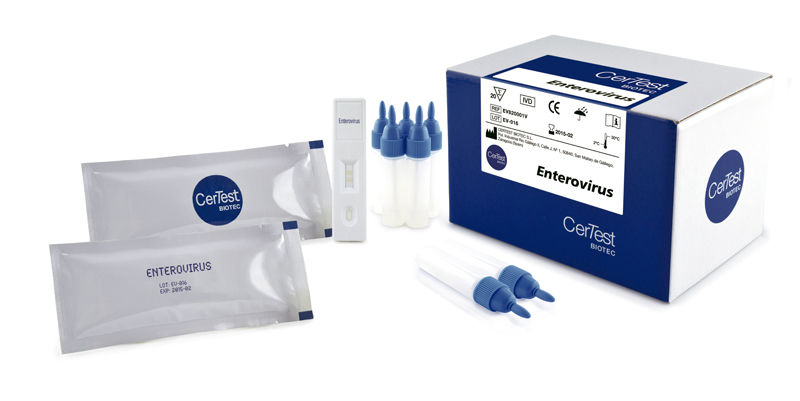
Rapid Test
Enterovirus

Description
CerTest Enterovirus one step card test is a coloured chromatographic immunoassay for the qualitative detection of Enterovirus in stool samples.
CerTest Enterovirus card test offers a simple and a highly sensitive screening assay to make a presumptive diagnosis of Enterovirus infection.
Specifications
Information
Enterovirus belongs to the Picornaviridae family and are the smallest, non-enveloped viruses known to infect both humans and animals.
The spread of enteroviral infections is mainly by the faecal-oral and oral-oral route, but also through direct contact with secretions from ophthalmic and dermal lesions. Enteroviruses are single-stranded RNA viruses. Water, food and soil contaminated by infected faeces are an exogenous infection source which creates many opportunities for the transfer of the infection, and cause an epidemic outbreak in a short period of time. The average incubation period for enteroviral contagious is from 3 – 10 to 30 days.
The virus, after replicating and breaking the gastrointestinal tract barrier, is transmitted via the blood stream to every organ of the body. Enterovirus reveals tropism towards organs like the heart, skin, and in particular the central nervous system. It has been proved that infected people excrete large quantities of the virus in faeces for a period of even 16 weeks.
Traditional division organizes this taxonomic group into the subgenera polioviruses, coxackieviruses (group A, B), echoviruses and a group of Enterovirus marked according to their serotype number (66 – 71 and newly identified 73 – 75, 77, 78). In 2003, the International Committee on Taxonomy of Viruses created a new taxonomy classification. Enterovirus henceforth was divided into 5 groups of species based on their molecular properties (HEV-A, HEV-B, HEV-C, HEV-D and poliovirus).
